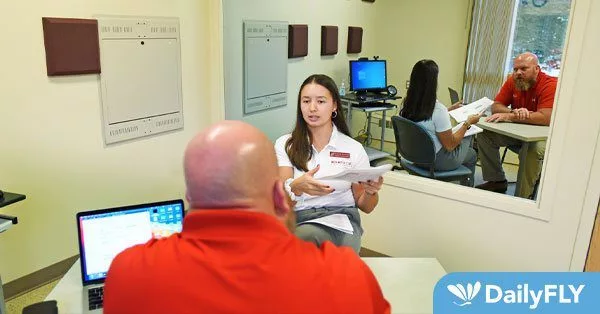PULLMAN – A partnership between two Washington State University colleges is ensuring athletic training students are prepared for the most difficult moments in their profession.
For the past four years, the College of Veterinary Medicine, through its Simulation-Based Education program, has collaborated with the College of Education to provide case-based simulations to athletic training students. The College of Veterinary Medicine’s simulation program is the first and only in veterinary medicine accredited by the Society for Simulation in Healthcare.
Athletic trainers are multi-skilled health care professionals specifically trained in the prevention, examination, diagnosis, treatment, and rehabilitation of medical conditions and emergent, acute and chronic injuries. Case-based simulations provide a critical source of training that can range widely from heated exchanges with coaches to farmers injuring themselves at work.
The simulations involve trained role-players (simulated participants), a facilitating faculty member and up to four peers who observe from a separate room through a one-way mirror. Similar to simulations provided to WSU veterinary students, students take turns interacting with the simulated participant. To the students, it feels real.
“I have to keep reminding myself that it’s not real,” said Katie Lukes, a student in her final year of WSU’s Athletic Training program. “The situations are really applicable to real life.”
Following the simulation, students debrief with their facilitator and peers about how the interaction went and what could be done to improve it. The sessions are also videotaped for students to watch themselves.
“When you’re in the moment, you don’t necessarily think about your cadence of speaking, your tone, if your organization made any sense or if you had left anything out. Sometimes having the opportunity to watch somebody else do it and then watch yourself back [on video] gives you a better sense of things that you don’t necessarily ever pick up on,” Lukes said.

Students like Lukes who are pursuing an athletic training degree will participate in one simulation each semester in their final three years in the College of Education’s five-year master’s program.
Cases focus on a variety of real-life medical and communication challenges, becoming more in-depth in the program’s later years. Participating in simulation helps students develop valuable skills they can employ in future professional endeavors.
“Seeing yourself do something gives you the confidence and the belief that you’ve done it before so you can do it again,” said Lukes.
Julie Cary, director of WSU’s Simulation-Based Education, said the partnership between the two colleges began nearly a decade ago when Phyllis Erdman, now executive associate dean for academic affairs at the College of Education, collaborated with Simulation-Based Education to use simulation for her educational psychology course.
“For us it’s part of being a community,” Cary said. “We are the two major health professions on this campus, and we happen to have expertise in this area, so it made sense that we would work together.”
Cary said there is always a place for simulation in education no matter the curriculum.
“You think about the things that we struggle with when we are first out of school, and it’s usually not the knowledge base; it’s usually the personal things or how do you understand what a customer is asking for, those trickier elements,” Cary said. “If we can prepare our learners to have some confidence and competence in those skills, it will help them succeed.”





